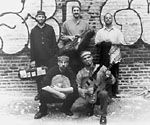JEWISH CULTURE has long been an object of wry amusement in this country—from Woody Allen’s neuroses to Jerry Seinfeld’s parents to the kitschy decor at Noah’s bagels. What Jewish culture has never been is serious, hip, and downtown. But it is now.
An urban Jewish revival is in full swing, centered in New York and led by some of the most progressive jazz musicians in the city. These players, mostly but not all Jewish, have embraced Semitic and other Eastern European sounds and are incorporating them into a new kind of spiritual improvisation reminiscent of jazz’s Afrocentric movement in the ’60s.
Hasidic New Wave
Dimitriou’s Jazz Alley, Tuesday, January 18
One of the most inspired bands to emerge from this scene is Hasidic New Wave, which recently released its third CD, Kabalogy, on Knitting Factory. Led by trumpeter Frank London and saxophonist Greg Wall, the quintet takes Hasidic melodies and “combines them with the downtown jazz aesthetic,” says drummer Aaron Alexander, “mixing in Arabic grooves, free playing, punk rock.” The phenomenal guitarist Dave Fiuczynski helps drive the group into all manner of strange harmonic realms and reverent grooves.
Wall and Alexander both take care to distinguish what they’re doing from “klezmer,” which has become the catchall marketing term for any Jewish-influenced music. Klezmer, which arose in the 19th century as folk music for Jewish weddings, got its downtown revival in the early ’90s and is still going strong, in both faithful and updated forms. Fronted by clarinet and violin, the music has a strong gypsy influence.
Hasidic music, on the other hand, is more devotional in nature and only sung, since religious Jews are prohibited from playing instruments on the Sabbath. “The style is much less ornamented and simpler than klezmer, which is often very note-y,” says Alexander. “A lot of these niggunim [or melodies] are wordless, just ‘dy, dy, dy. . . .'” Growing out of Judaism’s ecstatic Hasidic movement, which began in the 19th century, the songs, still heard today in neighborhoods like Williamsburg in Brooklyn, “were designed to be sung as a way of achieving enlightenment,” says Wall.
But enlightenment need not derive from simplicity alone, as the band’s revelatory jam-outbreaks make clear. “The band is a blowing band,” says Alexander.
Hasidic New Wave’s one-night appearance at Jazz Alley is a homecoming for the 33-year-old drummer, who grew up in Seattle and attended Cornish for several years. Alexander got his introduction to Jewish music as a member of the Mazeltones, a beloved Seattle klezmer outfit, now split up. Back then, he says, he was “a jazz drummer playing klezmer,” but he has since learned to approach the instrument “more as a hand drummer, without a lot of riding on the cymbals.” In ’93 he left to join the army of Seattle jazz kids—Brad Shepik, Briggan Krauss, Jim Black—now dominating New York. His delicate touch and expressive, unshowy proficiency gives Hasidic New Wave a deep, spiritual drive.
A BIT OF small-town kibbitzing made HNW’s Seattle show possible. Alexander’s father lives near the Tree of Life bookstore in Northeast Seattle, and when a customer mentioned to store owner Michele Yanow that he was in search of a band for his daughter’s wedding—a group preferably akin to his daughter’s fave, Hasidic New Wave—Yanow replied, “Well, why not call the band themselves? I know the drummer’s dad!” Pretty soon, HNW was booked for the gig and had its expenses covered to Seattle. This will be the band’s first wedding engagement—though most of the individual members are old hands at the Jewish simcha (or celebration) circuit.
Wall and Alexander say they’re not really sure how their music is viewed by the people who serve as its inspiration, though as Alexander observes, “We’re careful to do something real and not just give it lip service.” As a jazz player, he notes, “you play ‘Stella’ a thousand times until it’s in your subconscious and you don’t have to think about the form. That’s where we’re trying to get with this music too.” HNW is also moving beyond arrangements of Hasidic tunes into completely original material, as shown on Kabalogy, which features some powerful compositions from each of the band members.
Saxophonist Wall says something in the bittersweet Eastern European sound is attractive to listeners regardless of whether they are Jewish or not. But he takes particular satisfaction in the fact that Jews are turning out and identifying with their tradition. “In most urban areas, a lot of the music fans are Jews, but they would usually be the last people who would go to anything with a Jewish connotation,” he says. With a new cultural movement in full flower, that kind of reticence is “all gone now.”








